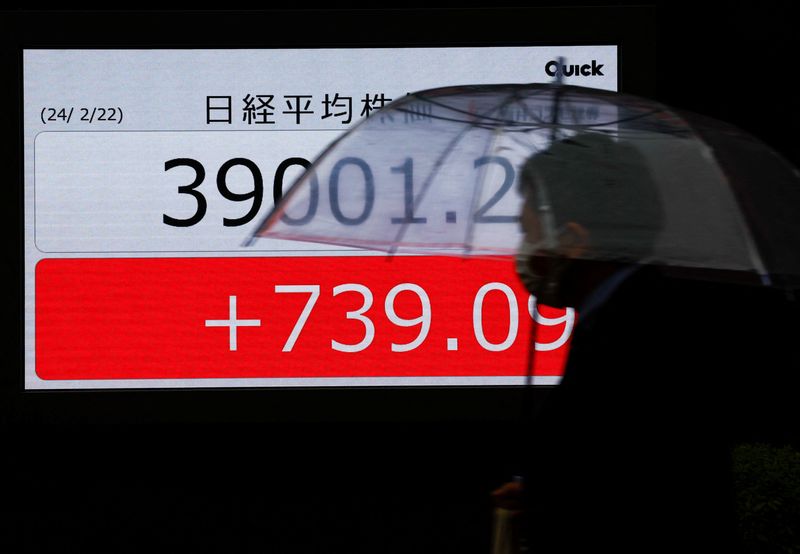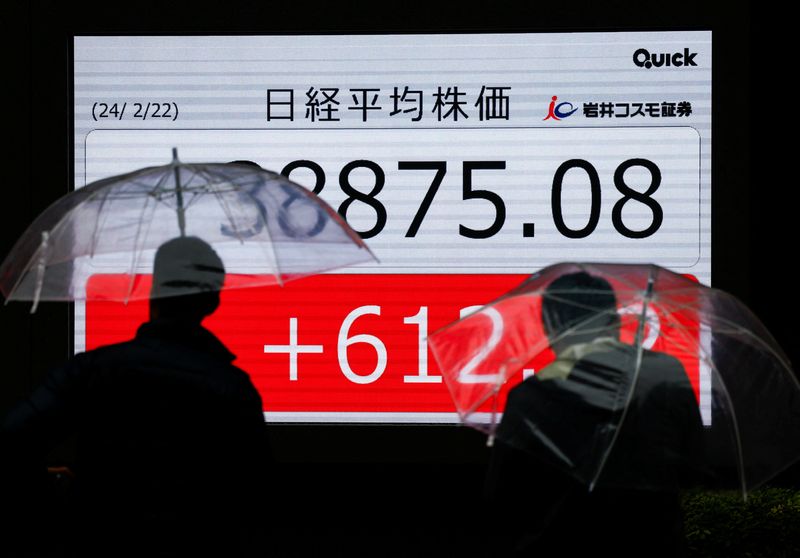(Reuters) - Japan's Nikkei share average hit a record high on Thursday, surpassing its 1989 peak after a year-long rally driven by cheap valuations, corporate reforms and investment flows diverted from a battered Chinese stock market.
Here's what analysts and investors say:
TSUTOMU YAMADA, SENIOR MARKET ANALYST, AU KABUCOM SECURITIES, TOKYO
"For us traders, this marks the arrival of a new era. It feels like the stock market is telling us that we've finally escaped from deflation and a new world has opened up.
"Compared with 34 years ago, the make-up of the stock market is totally different. Today, looking at the Nikkei average as a profitable security, it's still quite easy to buy. 39,000 is just a waypoint."
BART WAKABAYASHI, BRANCH MANAGER, STATE STREET, TOKYO
"We're approaching bubble status here. But interestingly, our custody data isn't showing aggressive buying of Japanese equities by real-money investors. I would tend to think that there's a lot of local money. Maybe the NISA initiative has had a positive effect.
"I'm not in any way denying that there's foreign money flowing into Japan, but I think the foreign investment portion of what has been reported may be a bit overblown. Living in Tokyo, it feels like a bubble, particularly if you look at real estate."
AYAKO SERA, MARKET STRATEGIST, SUMITOMO MITSUI TRUST BANK, TOKYO
"There is a possibility that the share price will go up and down wildly at some point for adjustment, but I don't think share prices will enter a downtrend.
"A key for the stock prices going ahead is how the Bank of Japan's monetary policy framework will be if the bank ends its negative interest rate policy. If negative interest rates were to be lifted to zero, there would be not much impact on stock prices as the markets have already priced in."
TOHRU SASAKI, CHIEF STRATEGIST AT FUKUOKA FINANCIAL GROUP. EX JPMORGAN, BANK OF JAPAN, TOKYO
"This peak is an impressive and historic level, but economically it doesn't mean much. EPS is increasing because of the weak yen and inflation. This peak level in 1989 and now is totally different.
"I'm continuing to be bearish on the yen, so if the yen continues to depreciate the EPS can inflate a lot more... There is still 'a lot of upside' to the Nikkei."
WEI LI, MULTI ASSET QUANT SOLUTIONS PORTFOLIO MANAGER, BNP PARIBAS ASSET MANAGEMENT, HONG KONG
"TSE reforms are expected to improve corporate profitability and increase shareholder returns. With more than half of Japanese stocks still trading with net cash, we anticipate a rise in buyback announcements.
"Despite Japan being a consensus overweight (OW), we believe that fund flows are still in the early stages and can support further outperformance in the region. The current global fund allocation to Japan equity remains underweight compared to the MSCI AC World index."
NORI CHIOU, INVESTMENT DIRECTOR, WHITE OAK CAPITAL, SINGAPORE
"I think Japan's stock market (will) likely see further upside this year thanks to one of (the) reasons of high interest from global institutional investors. We can see evidence like the surge in foreign buying in Japanese stocks, reaching nearly $30 billion in 2023 and continuing in the beginning of this year, (which) underscores a significant trend.
STEFANIE HOLTZE-JEN, ASIA-PACIFIC CIO, DEUTSCHE PRIVATE BANK, SINGAPORE
"There are two reasons why the Nikkei is powering ahead towards it all-time high, and is just a few percentage points from the psychological 40,000 level. First, yesterday the world's AI darling beat estimates with another set of solid results and better-than-expected sales forecast. And second, the USD/JPY pair is holding on to levels above 150, which is providing a cyclical tailwind to Japanese equities."
OLIVER LEE, CLIENT PORTFOLIO MANAGER, EASTSPRING INVESTMENTS, SINGAPORE
"The main drivers underpinning the rally have continued in 2024. Global investors are continuing to buy into the potential for a sustained change in corporate behaviour and thus increased profitability, and we therefore believe the long-term outlook for Japanese equities remains very positive."
RYOTA ABE, ECONOMIST, SMBC, SINGAPORE
"It's good news, but I think that there is a strong tailwind from Nvidia (NASDAQ:NVDA)'s strong results. Looking forward, I guess Nikkei will be volatile in the short term because of battles between profit-takers and those who expect it to go higher to 40,000. However, I assume buying pressures are stronger than selling.
"Weak yen will help Japanese firms improve their financial results in the next quarter, and it is also good news that more and more Japanese firms decide to hike wages more than the last year."
YUICHI KODAMA, CHIEF ECONOMIST, MEIJI YASUDA RESEARCH INSTITUTE, TOKYO
"The first word that came to my mind is 'finally'. Finally, it surpassed the bubble-era high after 30-plus years. But Japan today isn't 'bubbly' at all - it's hardly overvalued. The momentum for further rise is there. It will head to 40,000 yen levels next."
MATT SIMPSON, SENIOR MARKET ANALYST, CITY INDEX, BRISBANE
"The Nikkei made its inevitable run to 39k and now trades above it by a cat's whisker. But I always remain sceptical of such breaks of big numbers as they can suck in the late comers, only to find they have been 'caught short' at a record high before a volatile shakeout ensues. Call me a sceptic, but I never trust the first break. Even if it does show the potential to eventually trade higher."
TONY SYCAMORE, MARKET ANALYST, IG, SYDNEY
"I expect the 40,000 level to become the market's next objective for the Nikkei. If momentum names really start to get involved and add to positioning on the break of the 1989 high, we could see a blow-off type move in the short term towards 42,000."
RICHARD KAYE, PORTFOLIO MANAGER, COMGEST, TOKYO
"Japan has two major differences with every other market: its currency is at a multi-decade low and widely assumed to be an asymmetrical bet as soon as the yield gap with the U.S. narrows, and its domestic investor base includes some of the world's largest investors like Japan Post Bank but has been dramatically underweight its own market for 30 years.
"I think both of those factors... could power the Nikkei beyond what valuation and earnings analysis alone might suggest."
SHOKI OMORI, CHIEF JAPAN DESK STRATEGIST, MIZUHO SECURITIES, TOKYO
"The Nikkei will continue to rally, with foreign investors expecting domestic investors to support Japanese equities via the new NISA programme. The premium that Japanese stocks offer and aggressive 'animal spirit' buying will push Japanese equities up. On top of that, the more Chinese data comes out weak, the more Asian money will flow into the Nikkei."
ANDREW SHEETS, GLOBAL HEAD OF CORPORATE CREDIT RESEARCH, MORGAN STANLEY, LONDON

"We don't think positions on Japanese shares are overcrowded. The next challenge is that so far, the equity strength has coincided with a weak currency. That will be the next test, can the market stand on its own two feet if the currency moves sideways?
"There are scenarios where the yen strengthens modestly and that's good for some sectors. We have a favourable outlook for Japan stocks."
